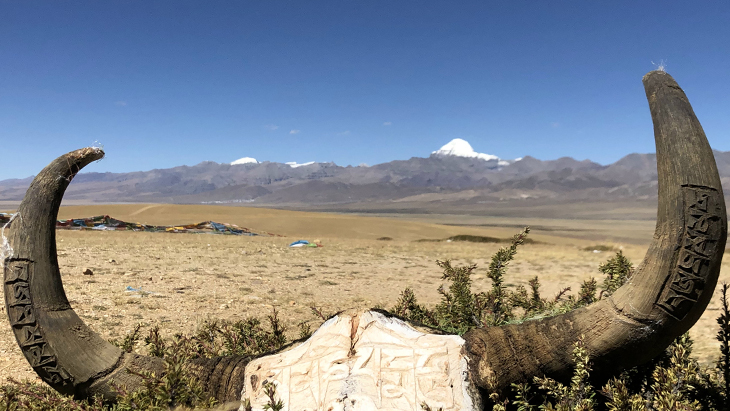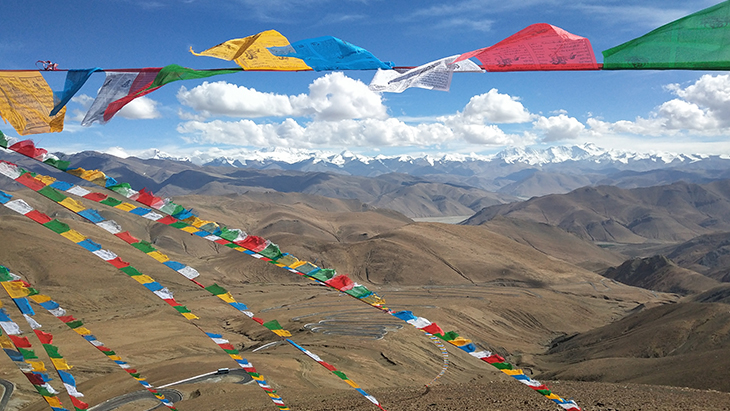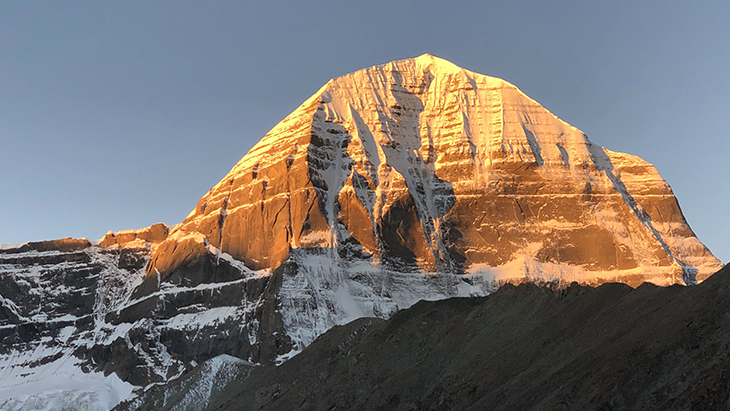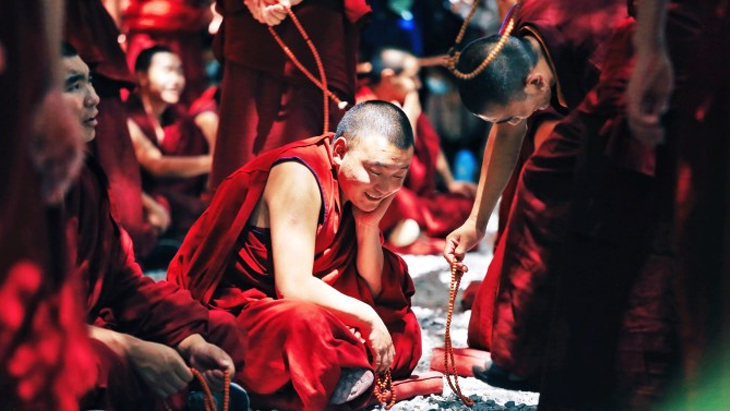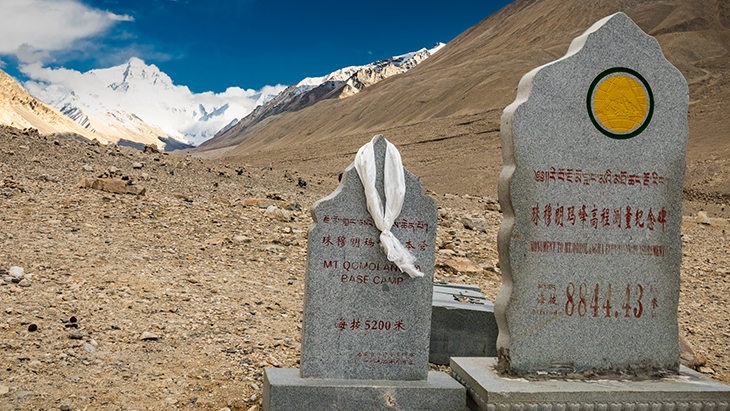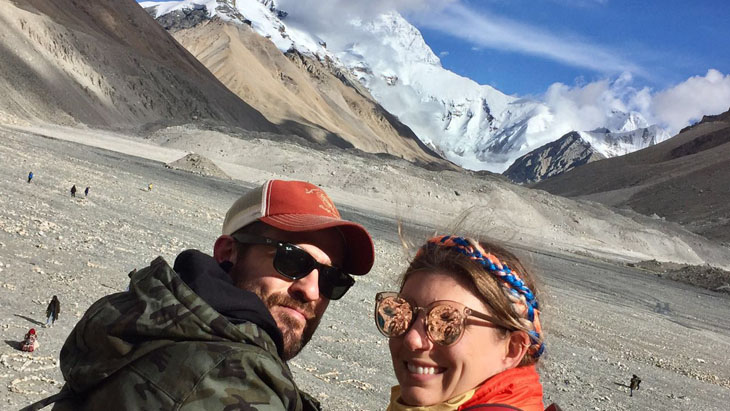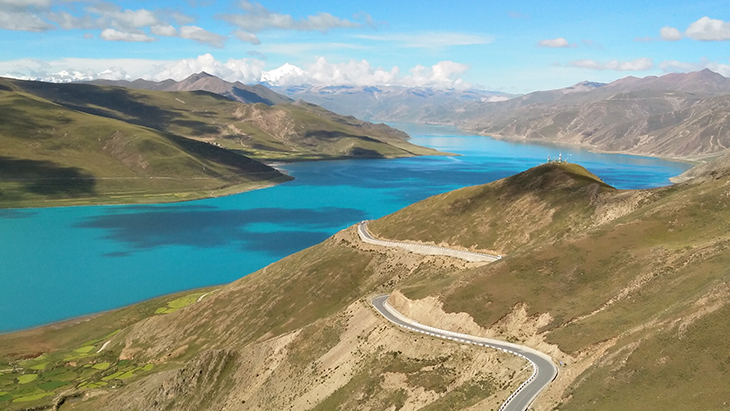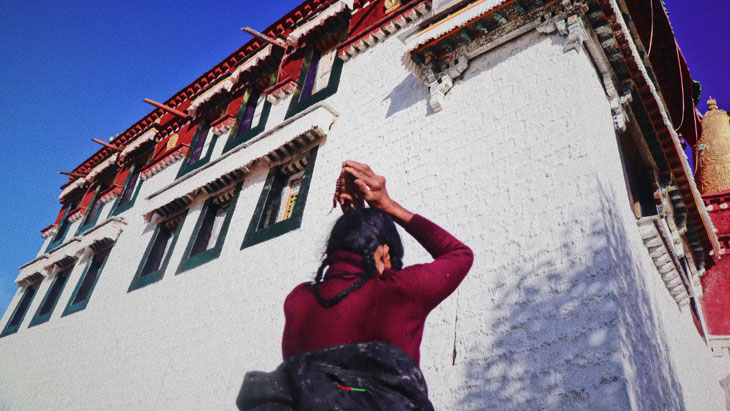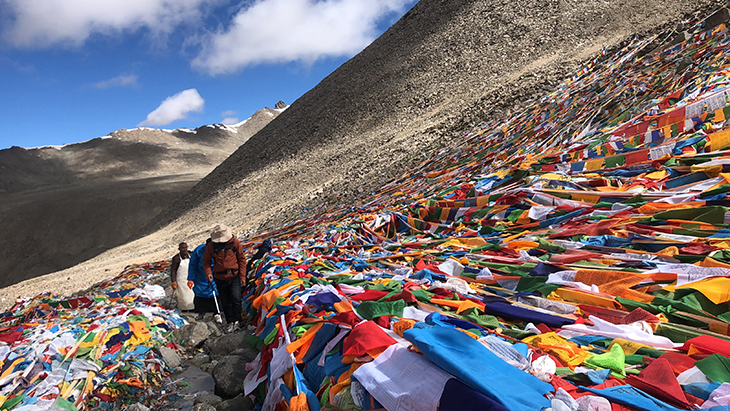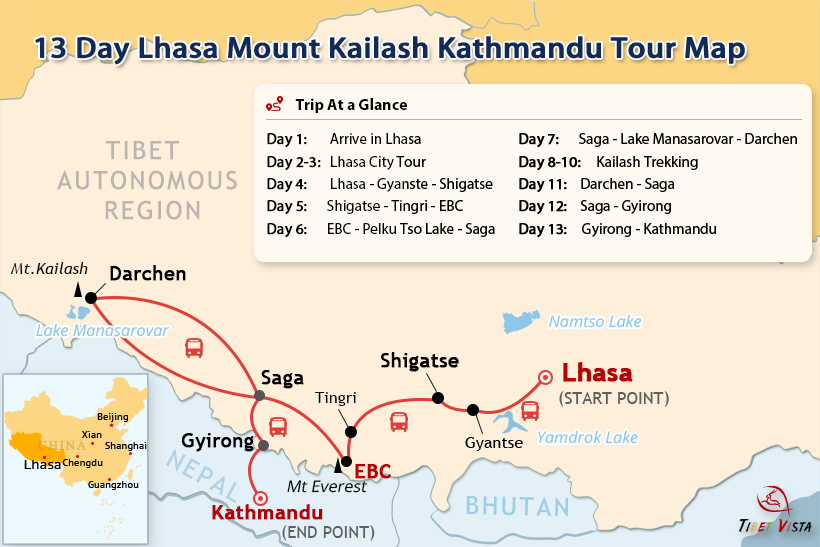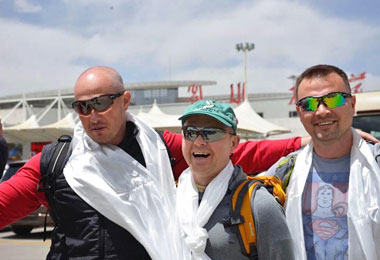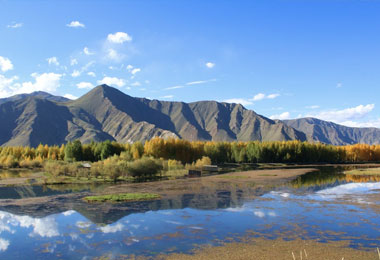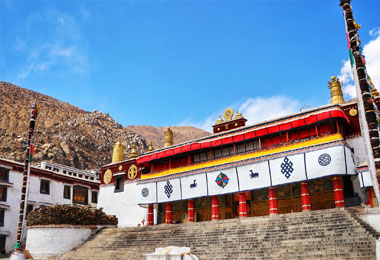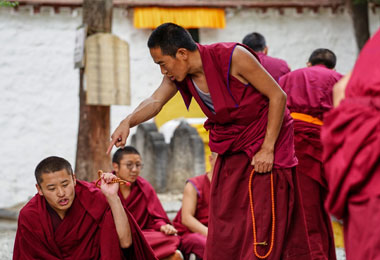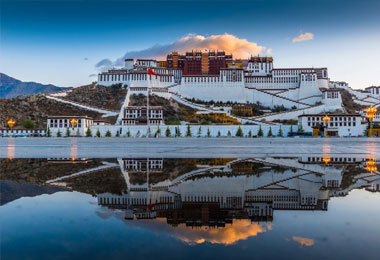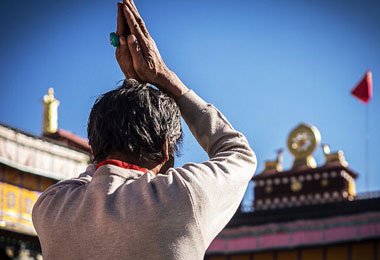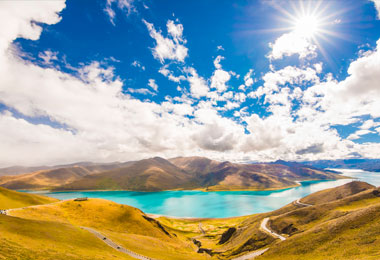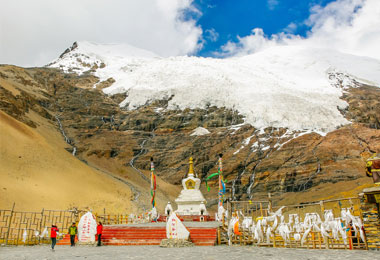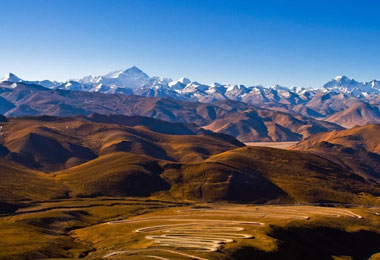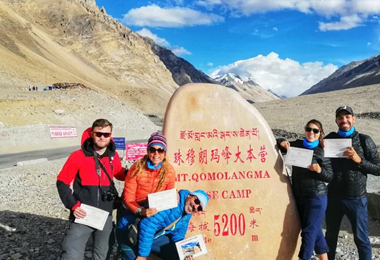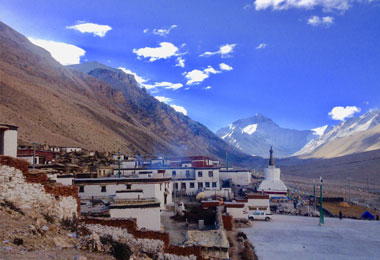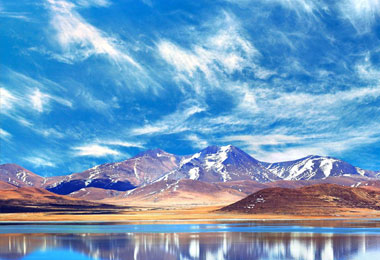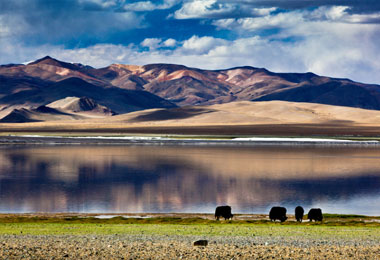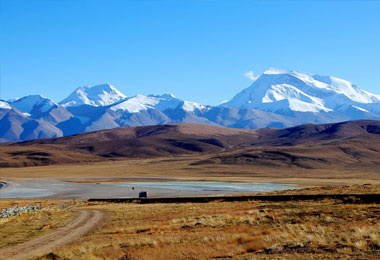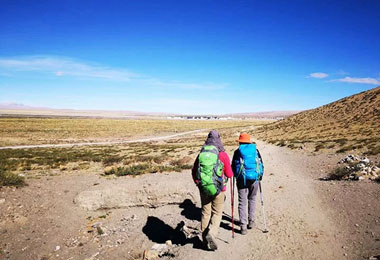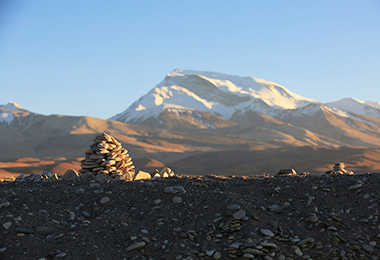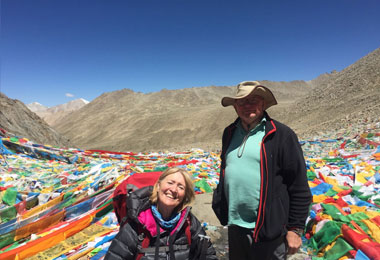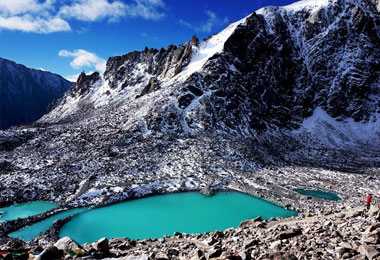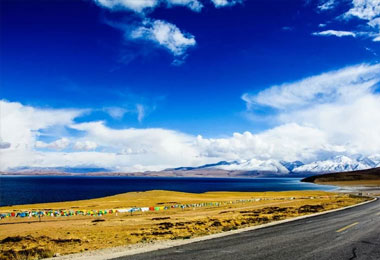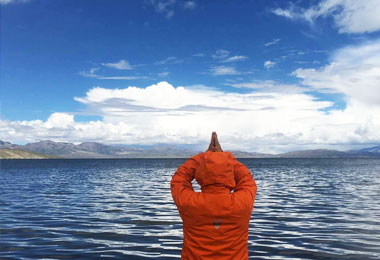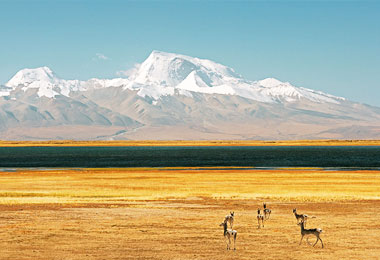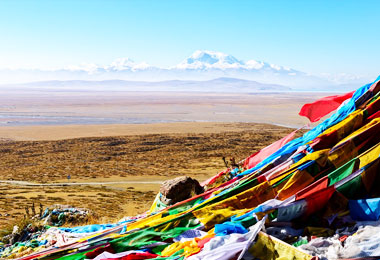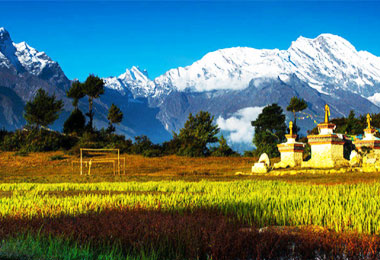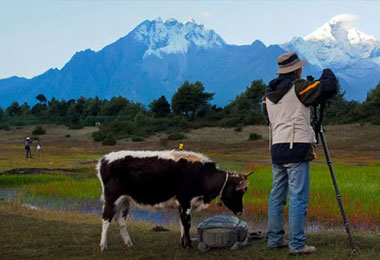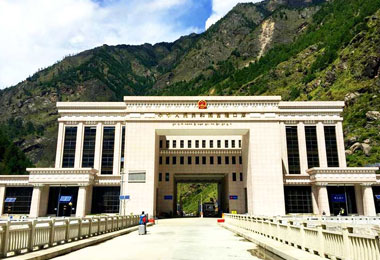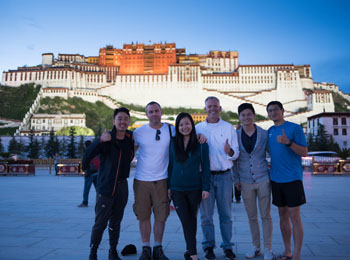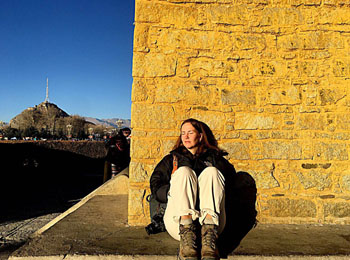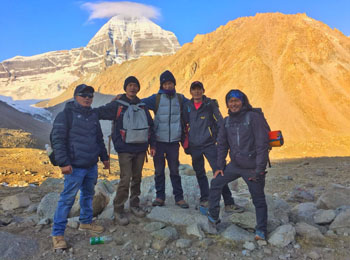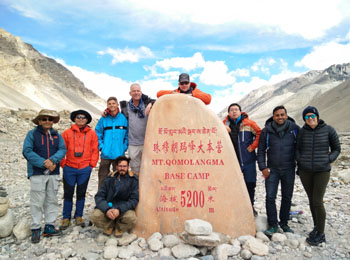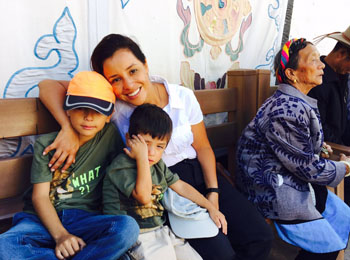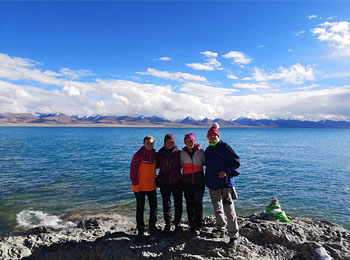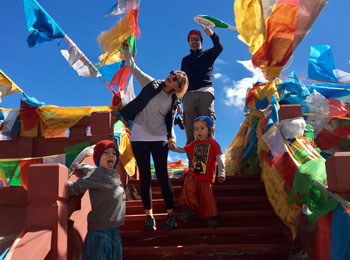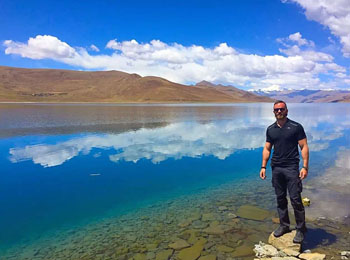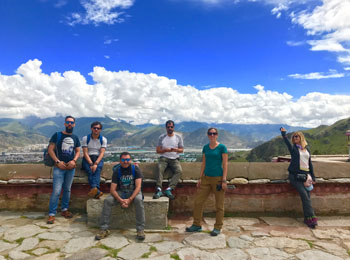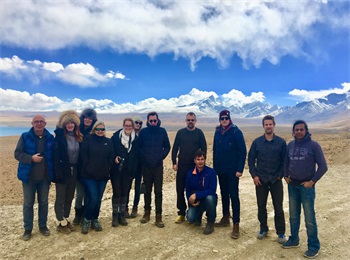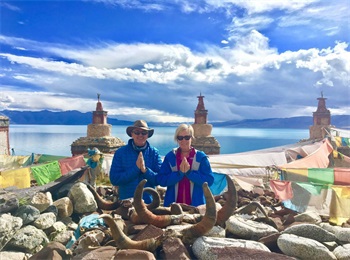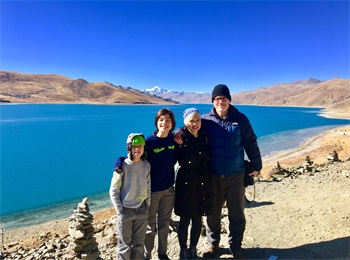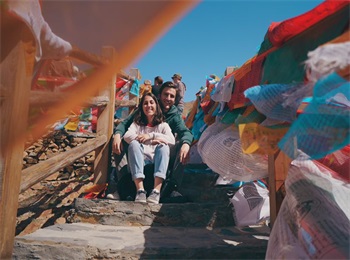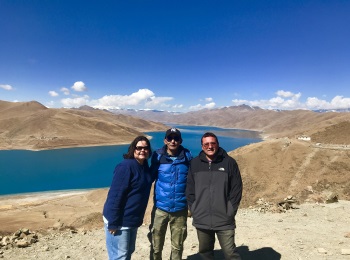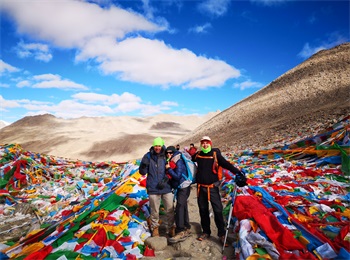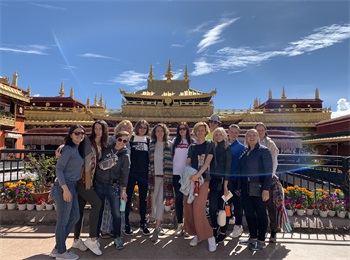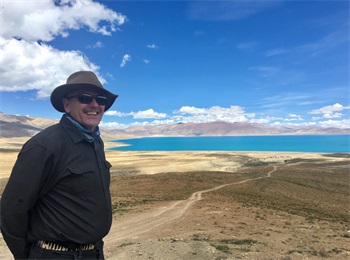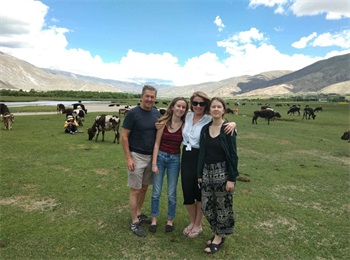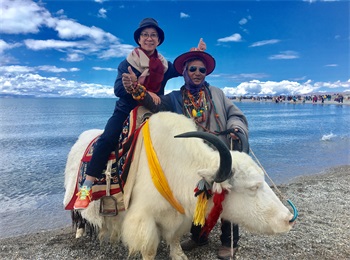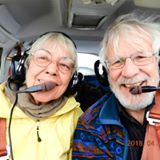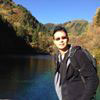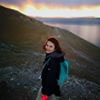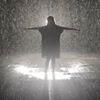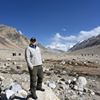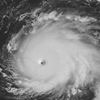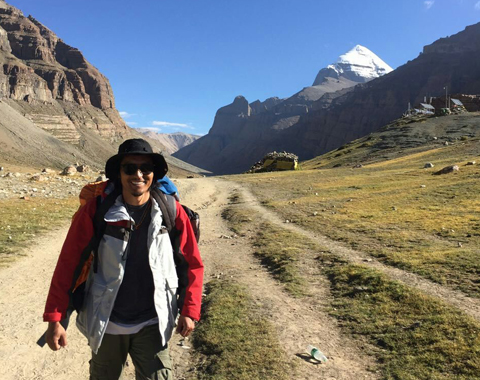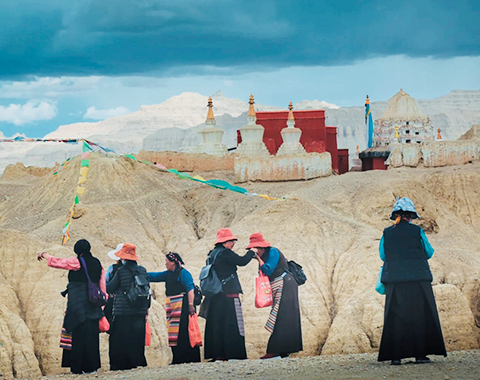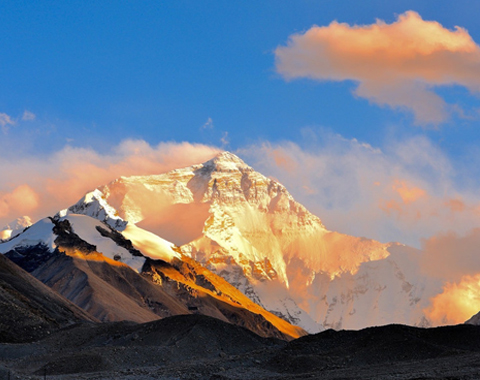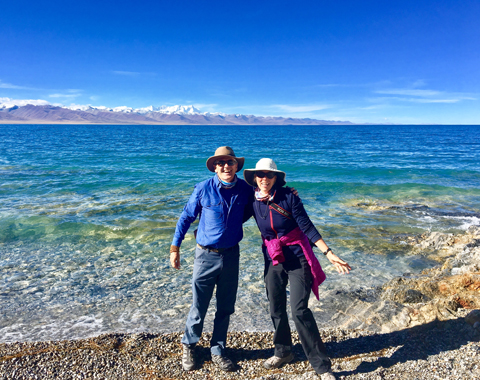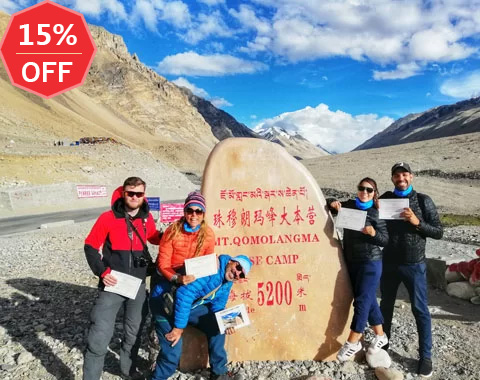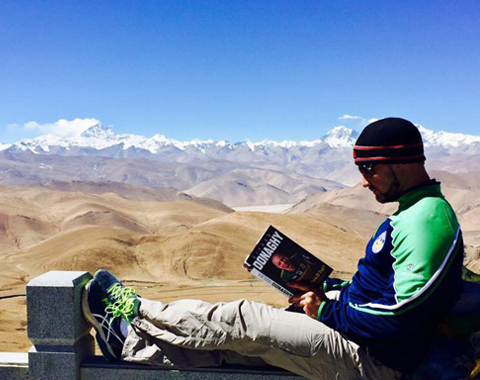13 Day Lhasa, Mt. Everest, Mt. Kailash, Lake Manasarovar and Kathmandu Adventure Tour
Tour Route: Lhasa - Gyantse - Shigatse - EBC - Saga - Darchen - Kailash Trek - Darchen - Saga - Gyirong - Kathmandu

 Tour Code:
TGT013
Tour Code:
TGT013
 Tour Type:
Join-in Small Group Tour (Min 1 to Around 12) i
Tour Type:
Join-in Small Group Tour (Min 1 to Around 12) i
- Guaranteed Departures: Our tour dates are fixed, ensuring each departure is guaranteed.
- Flexible Scheduling: If you can't find a date that suits your travel plans, no need to worry. Simply let us know your preferred travel time, and we'll create a custom schedule, inviting others to join you.
- Non-shopping Experience: Embrace a non-shopping adventure with us. We promise high-quality tours, ensuring an authentic and enriching experience in Tibet.
 Tour Service:
Tibetan Local Tour Guide & Driver
Tour Service:
Tibetan Local Tour Guide & Driver
 Time to Vist:
April to October
i
Time to Vist:
April to October
i
- Mount Kailash can be visited in spring, summer, and autumn, which is from April to late October.
- The Saga Dawa Festival is the grandest and the most important in Kailash region. While visiting Mount Kailash during the Saga Dawa Festival, you can fully experience the religious and cultural atmosphere here. Our Mount Kailash Saga Dawa Festival tour departs on May 16, 2024.
- Winter, from November to February, is too cold to visit the Mount Kailash area, and the roads always be blocked by heavy snow
 Trip Level:
Moderate for Physically Fit
i
Trip Level:
Moderate for Physically Fit
i
- Our most seasoned customer to complete this Kailash trek was an 82-year-old man from Germany. As long as you are physically fit without respiratory or heart problems, you can challenge the Kailash kora with an average altitude of over 4500 meters. Please consult your doctor for advice on whether you are suitable for such high-altitude trekking.

This epic overland trip is specially designed for tourists starting from Lhasa, and finishing in Kathmandu, enriching the Kailash experience to the fullest. 

13 Days from USD2059
- This price is based on double occupancy;
- This price is based on 3-star accommodation level in low season;
- This price doesn’t include the international airfare.
Overview & Highlights of this Trip
This 13-day Lhasa to Kathmandu overland tour with a visit to Everest Base Camp and a 3-day Kailash Kora is a spiritual adventure that no others can compare.
Starting in Lhasa, you'll explore the landmarks of the holy city, such as the Potala Palace and the Jokhang Temple. Immerse yourself in the daily life of Tibetan monks and local residents by visiting monasteries, local parks, traditional teahouses, and more.
After exploring the Lhasa city, travel west to Shigatse via the turquoise Lake Yamdrok and ancient Gyantse town. You will discover the second-largest city of Tibet before heading to the Everest Base Camp in Tibet.
You will enjoy the stunning view of Mt. Everest from different platforms along the way. With an overnight stay at the base camp, you may also have the chance to appreciate the sunset and sunrise at the top of the world.
Continue your journey along the highway to Mount Kailash in Ngari, completing the holy Kailash kora in 3 days alongside local pilgrims, experiencing the power of religion at the 'center of the world'.
Afterward, journey to Gyirong town at the Sino-Nepal border, exploring the lush Gyirong Valley with its distinct landscapes. Our Nepali staff will meet you at the border and assist you in reaching your hotel in downtown Kathmandu, either through our private transfer service or by public bus.
Embark on the Tibet to Nepal overland tour to Mount Everest and Mount Kailash, and you'll discover what you've been chasing.

Highlight 1 of this Trip: Enjoy the vibrant cultural and religious vibes by taking Kailash Kora during the Saga Dawa Festival.

Highlight 2 of this Trip: Refresh yourself at the holy Lake Manasarovar near Mount Kailash.

Highlight 3 of this Trip: Explore the lives of Tibetan monks and their practices by visiting monasteries with our Tibetan guide.

Highlight 4 of this Trip: Admire the Potala Palace, the UNESCO World Heritage Site and the landmark of Lhasa.

Highlight 5 of this Trip: Experience the beauty of Yamdrok Lake up close, marveling at its stunning vistas from various points.

Highlight 6 of this Trip: Enjoy the panoramic view of the highest Himalayan peaks at Gawula Pass on the way to Everest Base Camp.

Highlight 7 of this Trip: Appreciate the splendid starry night at Everest Base Camp.

Highlight 8 of this Trip: Visit Everest Base Camp at an elevation of 5200m above sea level and witness the summit of the world.

Highlight 9 of this Trip: Witness Mt.Shishabangma (8027m) with Pelku Tso Lake beneath the snow-capped peaks.
Itinerary Details
Trip at a Glance
Day 1: Lhasa Arrival
Day 2: Lhasa Day Tour
Day 3: Lhasa Day Tour
Day 4: Lhasa - Gyantse - Shigatse
Day 5: Shigatse - EBC
Day 6: EBC - Peiku Tso Lake - Saga
Day 7: Saga - Lake Manasarovar - Darchen
Day 8: Darchen to Dirapuk Trek
Day 9: Dirapuk to Zutulpuk Trek
Day 10: Zutulpuk to Darchen Trek
Day 11: Darchen - Saga
Day 12: Saga - Gyirong
Day 13: Gyirong - Kathmandu
Day 1: Arrival in Lhasa
Welcome to Lhasa (3650m)!
When you arrive in Lhasa, whether by train or flight, our friendly Tibetan guide will greet you with a Hada (the traditional Tibetan ceremonial scarf) and warm blessings.
Then, the guide and the driver will take you to your hotel in downtown Lhasa. You may view the Yarlung Tsangpo River/Brahmaputra River (the Longest and largest river in Tibet) and Lhasa River.
After settling into your hotel, take some time to rest and adjust to the high altitude.
In the afternoon or evening, your guide will meet you with traditional Tibetan gifts, provide travel instructions, and introduce your group members.
If you need any help or specific needs, feel free to visit our service center at Lhasa Gang Gyan Hotel.
Stay overnight in Lhasa.
 Overnight in Lhasa
Overnight in LhasaDay 2: Lhasa Tour - Drepung Monastery and Sera Monastery (B, D)
Today is Tibetan Monastery Day! You’ll have a full day to explore the largest monastery in Tibet, delve into the knowledge of Tibetan Buddhism, and immerse yourself in the daily life of Tibetan monks.
In the morning, you’ll explore the largest monastery in Tibet - Drepung Monastery, which was once the home to over 10,000 monks. As you walk through the Coqen Hall, your guide will provide detailed explanations of the worldview of Tibetan Buddhism and introduce notable figures in Tibetan Buddhist history.
Next, you’ll visit the renowned Loseling College (or an equivalent), offering a glimpse into the study and life of Tibetan monks. Explore their dormitories to gain insights into the Tibetan monks' daily routines and living conditions.
In the afternoon, you’ll head to Sera Monastery, another of the ‘great three’ Gelug monasteries of Tibet, to witness the famous Tibetan Monks Debate (15:00 - 17:00, from Monday to Saturday). Your guide will intricately explain how Tibetan monks engage in these debates to acquire knowledge and advance in their academic degrees.
After today’s tour, enjoy a welcome dinner with your group members.
 Overnight in Lhasa
Overnight in Lhasa Breakfast | Welcome Dinner
Breakfast | Welcome DinnerDay 3: Lhasa Tour - Potala Palace, Jokhang Temple, Barkhor Street (B)
Today’s Highlight is a visit to UNESCO World Heritage Sites Potala Palace and Jokhang Temple, providing a glimpse into the daily beliefs and lives of the people of Lhasa.
After breakfast, your first stop is the Potala Palace, where you can enjoy a panoramic view of the Lhasa Old Town. Discover the lives and stories of the Dalai Lamas through history within the palace, and the extraordinary treasures it holds. The most valuable collections of Potala Palace are the gilded burial stupas of former Dalai Lamas and the meditation cave of the 33rd great king of Tibet.
After touring the Potala Palace, you will visit Longwangtan Park at the foot of the Potala Palace. Here, you can appreciate the majestic Potala Palace from a different perspective and engage in local Tibetan folk activities.
In the afternoon, you will head to the heart of Tibetan religion - the Jokhang Temple. Inside you can see the statue of Buddha Sakyamuni at the age of twelve. Outside, you can see pilgrims making prostrating in front of Jokhang Temple. Around the temple is Barkhor Street, where you can do kora (a religious circle of a building or mountain) with pilgrims and locals, and explore the old market.
Next, follow your guide to one of the liveliest indoor Tibetan tea houses in Lhasa. Sip traditional Tibetan sweet tea alongside local Tibetans as your guide shares insights into Tibetan social dynamics and daily life.
Stay overnight in Lhasa.
 Overnight in Lhasa
Overnight in Lhasa Breakfast
BreakfastDay 4: Lhasa to Shigatse via Gyantse 360 km (B,L)
In the morning, start the overland journey from Lhasa to Shigatse, which includes visits to Tibet's most beautiful lake, glacier, and a charming Tibetan village.
First, drive over the Gampala pass (4790 m) to catch a glimpse of Yamdrok-tso (4400m). The Yamdrok Lake is surrounded by many snow-capped mountains and in the distance you can have spectacular views of Holy Mount Nyenchen Khangsar (7191m), the highest mountain near Lhasa. Continue to explore the lakeshore from various viewpoints, and at the end of the lake, you could visit a local family in the village and have lunch with the locals.
Next, you will pass and enjoy the Korola Glacier on the roadside. It is the largest glacier in Tibet. As you see the ice tongue of the glacier climb the entire hillside, you will feel the magical power of nature.
Then, continue your journey to Gyantse. On the way, you will stop at Simila Mountain Pass, where you can hang prayer flags to pray for world peace and the health of your family.
After arriving in Gyantse, you can spend some time taking photos of the ancient city of Gyantse. From Gyantse to Shigatse, you will pass by green (in summer) and golden (in autumn) Tibetan barley fields and countless farms.
Finally, we arrive in Shigatse, the second largest city in Tibet. After checking in to the hotel, you can take a good rest and prepare for the next day’s trip to Mount Everest.
Stay overnight in Shigatse.
 Overnight in Shigatse
Overnight in Shigatse Breakfast | Lunch with a Tibetan Village Family
Breakfast | Lunch with a Tibetan Village FamilyDay 5: Shigatse (3850m) to Everset Base Camp (5200m) (B)
Take the most use of your time today to admire the stunning Himalayan mountain ranges!
After breakfast, you will head directly to Mount Everest.
First, you will pass Gyatsola Pass (5280m). At Gyatsola Pass viewpoint, you’ll catch your first glimpse of Mount Everest. Hidden behind the mountain range, the Everest resembles a budding lotus flower, a captivating sight along the roadside.
Shortly after we enter Mount Everest National Nature Reserve, you will enjoy the panoramic view of the Himalayas at Gawula Pass (5198m). At this viewpoint, you will marvel at the majestic lineup of the five highest peaks in the Himalayas, including Everest at the forefront. This is your second glimpse of Everest.
Then, we drive along the new zigzag road to Everest Base Camp (5200m). As you get close to the base camp, the majestic Everest gradually unfolds before you, drawing nearer with each winding turn. This marks your third view of Everest.
Upon reaching Everest Base Camp, the colossal white pyramid peak of Mount Everest stands towering before you. As the day transitions to dusk, witness the golden hues of the sun casting a warm glow on Everest's northern face—your fourth view.
As night falls, the sparkling Milky Way and the snow-white peak of Mount Everest reveal your fifth and final encounter with Everest.
Stay overnight at Everest Base Camp or in the local village near EBC if the EBC tent hotels are closed during the winter season.
Insider Tips:
1. The visibility of Everest is subject to weather conditions and cannot be guaranteed.
2. During the winter season, typically from November to March, the tent hotels at Everest Base Camp close. Therefore, if you’re traveling in winter, your accommodation options are limited to the village near EBC.
 Overnight in EBC Tent Hotel
Overnight in EBC Tent Hotel Breakfast
BreakfastDay 6: Everest Base Camp to Saga via Pelku Tso Lake
Continue your journey westward into the Ngari Plateau along the Himalayas, enjoying the grassland, lakes, and snow-capped mountains along the way.
In the morning, you may have the chance to see the pink sunlight casting its glow upon the summit of Mount Everest.
After breakfast, visit the Rongbuk Monastery, the world’s highest-altitude monastery at 5154 meters above sea level.
Then, move on to Ngari, the most mysterious region in Tibet, to visit the sacred Mount Kailash and holy Lake Manasarovar. On the way, you’ll pass by Mt. Shishabangma (8027 meters), one of the world’s highest mountains over 8000 meters. You can enjoy a close view of the three main peaks of Shigabangma, as well as the golden glow of Pelku Tso Lake beneath the peaks.
After crossing the grassland around Peiku Tso Lake, you’ll reach Saga County, the transfer hub of western Tibet. This marks your entry into the gateway of the Mount Kailash region. The rest of the journey to Mount Kailash is at an average elevation of 4500 meters on the Ngari Plateau. If you need some essentials for your Kailash trek, you can buy them in Saga County.
Stay overnight in Saga.
 Overnight in Saga
Overnight in SagaDay 7: Saga to Darchen via Zhongba
After breakfast, you’ll start today’s journey through the Saga Valley between the Himalayan Range and the Gangdise Range, marveling at continuous snow-capped peaks, vast grassland, and stunning lakes along the way.
En route, you may witness herds of yaks and sheep on the vast grasslands beneath the snow-capped mountains. Meanwhile, you’ll pass by the beautiful green lake - Gongzhucuo Lake.
After passing through the Mayum La Mountain at 5211 meters, you officially enter the Ngari Region. Crossing the mountain pass feels like entering a wilderness inhabited by wild animals, with the holy Lake Manasarovar coming into view. The view of Lake Manasarovar, with Mount Kailash in the distance, often makes people feel amazed and inspired.
Driving along the lake, you reach the sacred Mount Kailash, the ultimate destination of this journey.
Upon arrival in Darchen, the little town at the foot of Mount Kailash, settle into your hotel, recharge, and prepare for the upcoming 4-day Mount Kailash trek.
Stay overnight in Darchen.
Insider Tips:
If you need a porter, kindly inform your guide on this day, and your guide will arrange one for you the following day. Please note that the cost of the porter requires an additional payment.
 Overnight in Darchen
Overnight in DarchenDay 8: Darchen to Dirapuk Monastery (Trek Day 1: 13km)
Start your first day of trekking along the valley at the base of Mount Kailash! Enjoy the picturesque views of its southern, southwestern, and western slopes.
After breakfast, you are supposed to take an eco-bus from Darchen to Sarshung Valley, where to start today’s 13-kilometer trek around Mount Kailash.
The first 13 kilometers are relatively easy, guiding you through the valley at the foot of Mount Kailash. You can clearly see the southern and western slopes of the sacred Mount Kailash.
After reaching the foot of the western slope, you will check in at the guesthouse in Dirapuk Monastery.
For the remainder of the day, follow our guide to explore the ancient Dirapuk Monastery (also known as Zhire Temple). Capture unforgettable moments in front of the sacred stupas and the grandeur of the western slope of Mount Kailash.
Weather permitting, immerse yourself in the awe-inspiring spectacle of the sunset over Mount Kailash from Dirapuk Monastery. Witness the sun's afterglow delicately illuminating the steep cliffs of the western slope as night descends.
Stay overnight in Dirapuk Monastery Guesthouse.
 Overnight in Dirapuk Monastery Guesthouse
Overnight in Dirapuk Monastery Guesthouse Breakfast
BreakfastDay 9: Dirapuk Monastery to Zutulpuk Monastery (Trek Day 2: 24km)
Are you ready for the most challenging day of your Mount Kailash Trek? On this day, you’ll trek across the highest point at 5630 meters, and walk alongside devout prostrating Buddhist pilgrims.
Start your day early with a 4-kilometer trek from Dirapuk Monastery to reach 5430 meters. This section offers a rapid climb with a breathtaking view of the sunrise over the northwest slope of Mount Kailash.
Afterward, you’ll continue another 2-kilometer trek to Dolma La Pass, the highest point at an altitude of 5630 meters. Along this path, you’ll see prayer flags hanging everywhere on the pass.
(Notice: The high altitude means even in summer, the path is icy and scattered with rocks, requiring caution to prevent slipping.)
After successfully crossing Dolma La Pass, you’ll be greeted by the emerald-green Lake of Compassion (also knonw as Guri Kund), believed to purify a lifetime of sins with a dip. You’ll also witness the thick glaciers on the northwest slope of Mount Kailash.
Following the Lake of Compassion, a gradual descent leads you to the valley beneath the southeast foot of Mount Kailash, where Zutulpuk Monastery (also known as Dzutripuk Monastery) is located. Here, you may encounter adorable wild animals and find a peaceful resting spot on the grasslands.
Stay overnight in Zutulpuk Monastery Guesthouse.
 Overnight in Zutulpuk Monastery Guesthouse
Overnight in Zutulpuk Monastery GuesthouseDay 10: Zutulpuk Monastery to Darchen (Trek Day 3: 12km)
Complete the Mount Kailash kora and refresh yourself at the holy Lake Manasarovar.
In the morning, you’ll trek back from Zutulpuk Monastery to Darchen, the starting point of Kailash Trek.
After completing the Kailash trek in the morning, you are going to take a 30-kilometer drive to Lake Manasarovar. You’ll approach the shores of the sacred lake to touch its holy waters.
At the lakeside, you can engage in meditation, listen to the rhythmic waves of the sacred waters, or simply clean your body with the holy water, which holds significant spiritual meaning for Hindus and Buddhists.
There are also hot springs (optional) offering foot baths or soaking opportunities for visitors. If the Mount Kailash pilgrimage has left you feeling weary, consider spending a few dollars to enjoy the hot springs.
After today’s tour, get back to Darchen.
Stay overnight in Darchen.
 Overnight in Darchen
Overnight in DarchenDay 11: Darchen to Saga
Today, you'll say goodbye to the Ngari Plateau and return to the Himalayas.
After breakfast, you’ll travel back to Sage and relive the scenic wonders of the Ngari Plateau, the Himalayas, and the Gangdise Mountains. Along the journey, you can stop at grassy pastures and lakes to get close to the nature and wildlife of Ngari.
Later today, you will finally arrive in Saga.
Stay overnight in Saga.
 Overnight in Saga
Overnight in SagaDay 12: Saga to Gyirong
Today’s highlight is to explore the snowy mountains and forests on the edge of the Himalayas.
In the morning, start your journey to Gyirong Valley, the hidden gem on the Sino-Nepal border. As the altitude drops, the scenery along the roadside changes from snow-capped mountains and wastelands to dense forests and canyon landscapes.
Upon reaching Gyirong Town in the afternoon, you’ll explore Gyirong Valley described by British explorer Howard-Bury as the most beautiful valley in the world in his book 'Mount Everest: The Reconnaissance'.
Here, you can visit the Sherpa villages and admire dense forests, serene villages, and beautiful snow peaks above the woods. Additionally, you can experience the humid and mild oxygen, quite distinct from the dry and thin air of the Ngari Plateau.
Stay overnight in Gyirong.
 Overnight in Gyirong
Overnight in GyirongDay 13: Gyirong to Kathmandu
Farewell to Tibet and welcome to Nepal today!
After breakfast, it’s time to say goodbye to your Tibetan guide and driver. Our Nepali staff will meet you at the Nepal border, assist with handling your large luggage (additional fee required), help you apply for a Nepal visa, and ensure a safe transfer for both you and your belongings to your hotel in Kathmandu with Tibet Vista’s vehicle.
After entering Nepal, you will see many snow mountains in the southern foothills of the Himalayas, such as Gaurishankar Himal (7134m), Ganesh Himal (7422m), Annapurna Range's Annapurna III (7555m), Lamjung W (6983 m), Mount Kanguru (6981m), Himchuli West (6441m), Ngadi Chuli (7871 m), and Gaurishankar (7181m).
Due to the poor road conditions, we will not make frequent stops. Nevertheless, you'll be treated to captivating landscapes along the way, savoring the last glimpses of the Himalayas.
Upon your arrival at your hotel in Kathmandu, the tour service ends.
Tour Cost & Schedule in 2024
| Class/Price for Per Person | Apr.1 to May.31 | Jun.1 to Jul.9 | Jul.10 to Aug.20 | Aug.21 to Sept.19 | Sept.20 to Oct.10 | Oct.11 to Oct.31 |
|---|---|---|---|---|---|---|
| Economic Class (3-Star Hotels) | 2059 US$ | 2229 US$ | 2319 US$ | 2229 US$ | 2319 US$ | 2059 US$ |
Please Note:
If you couldn’t find a tour date suitable for your travel schedule in the above form, please contact our travel experts and they will help you plan a delightful vacation to Tibet at the BEST local price.
Price Inclusions:
Tibet Travel Permit and all required local travel documents for this tour (excluding expedited processing fees);
Local tour transfers, 5-29 seats comfortable tourist vehicle according to the group size;
All entrance ticket fees for all tourist sites listed in the itinerary;
All meals listed in the itinerary;
Knowledgeable English-speaking Tibetan local tour guide shared in your group (For prices of tour guides in other languages, please inquire);
All hotels listed in the itinerary or equivalent three-star hotels. Upgrades are available for an additional fee. (Single room supplement required when not sharing the room);
Free shuttle between Lhasa Railway Station/Lhasa Gonggar Airport and the downtown hotel;
Service Charge & Government Taxes;
Arrangements including planning, handling, operational, and communication charges;
Tourist accident/casualty insurance;
Additional services include fine Tibetan souvenirs, a tourist map, portable oxygen, medical oxygen in the vehicle, bottled mineral water, and more.
Price Exclusion:
China Visa (If you need visa assistance services, feel free to contact us for more details.);
Nepal Visa (30 USD in cash for a 15-day Nepal visa at the Gyirong border);
International flight to China;
Domestic flight/train to Lhasa (If you need us to book the domestic flight/train tickets, please contact us for the details.);
Single Room Supplement: Hotels default to double occupancy with twin-bedded rooms. If you prefer a single room or room sharing isn't possible, a single room supplement is necessary. Please consult the travel consultant for specific pricing details.
Meals not listed in the itinerary;
Porters and Yaks for carrying luggage during Mount Kailash trek;
Tips for the guide and driver. If you are satisfied with their service, it is suggested to tip $7 (50 RMB) per day per person to be shared between the driver and the guide;
Other expenses caused by force majeure events (such as natural disasters, traffic control, loss of valuables, visa delays, flight delays or cancellations, etc.);
Personal expenses, like laundry, phone calls, snacks, soft drinks (please do your best to avoid alcoholic beverages during your Tibet trip), optional tour activities, etc.
Lhasa Mount Kailash Kathmandu Trip Notes
First, you need to obtain a Chinese Visa. With your Chinese visa and a valid passport, you can apply for the Tibet Travel Permit.
As Mount Kailash is situated in the remote western part of the Tibet Autonomous Region, additional travel documents are required for your visit, such as the Alien’s Travel Permit and the Military Permit.
For the Nepal Visa, you need to pay 30 USD in cash to apply for a 15-day Nepal visa at the border. Please prepare the visa fee in advance.
All necessary documents for visiting Mount Kailash (except for your Chinese Visa and Nepal Visa) are included in our packages. We guarantee the Tibet Travel Permit and other permits to ensure a worry-free Mount Kailash experience for you.
Just make sure to obtain your Chinese Visa in advance.
Generally, it takes around 7 to 14 working days to process the Tibet Travel Permit. Given the additional travel permits required for a trip to Mount Kailash, the processing time could be longer than for ordinary Tibet tours.
It is recommended to book your Mount Kailash tour at least 30 days in advance to allow sufficient time for processing all required paper applications.
Once you book your Lhasa to Kathmandu tour with us, simply provide scanned copies of your Chinese Visa and a valid passport (with at least 6 months of validity).
If you traveling with a work visa, you will need proof of employment in China, and a study visa requires proof of your study in China.
Generally, it takes 7-14 working days to process the Tibet Travel Permit. Once the permit is successfully issued, we will mail it to your address in China 3-5 days before your Tibet trip, ensuring you can smoothly board the train or flight to Tibet.
For Indian passport holders, the Tibet Travel Permit needs to be applied through the Foreign Affairs Office of TAR or the Pilgrim Center.
Please contact us for detailed information.
Mount Kailash is accessible year-round, excluding harsh winter conditions. The best months for clear mountain views and pleasant weather are May, June, September, and October.
For a rich cultural experience, you can visit Mount Kailash during the Saga Dawa Festival in May or June (April 15 in the Tibetan Calendar), to experience how the pilgrims celebrate the birth, enlightenment, and nirvana of the founder of Buddhism, Sakyamuni. This is a rare opportunity to immerse in the strong religious atmosphere and join the kora with devoted pilgrims.
Notice: Our Mount Kailash tour for the Saga Dawa Festival in 2024 departs on May 16th, 2024. If you want to join us, make your reservation as early as possible.
Summer (July to August) is the rainy season in both Nepal and Tibet. While most rainfall occurs at night, it doesn't impact daytime activities. The only inconvenience for visiting in summer is that roads on the Nepal side are often affected by heavy rains, potentially causing landslides and road damage.
The trek around Mount Kailash, also known as the Kailash kora, typically takes 3 days.
Day 1: Darchen to Drirapuk Monastery (Trek 13km)
Day 2: Drirapuk Monastery to Dzutrpuk (Trek 24km)
Day 3: Dzutripuk to Darchen (Trek 7km)
Among the three days, the second day is the most difficult as you need to pass through the Dromala Pass, the highest point on this trail at 5630 meters above sea level.
Mount Kailash is 6638 meters above sea level, and the highest point you will pass during your Mount Kailash trek is the Dromala Pass, which is 5630 meters above sea level.
From Lhasa to Mount Kailash, the altitude rises from 3658 meters to over 4500 meters in the Ngari Plateau. En route, you will visit Mount Everest and stay one night at Everest Base Camp at 5200 meters above sea level.
Check the altitude of major attractions along the way as below:
| Attractions | Altitude |
|---|---|
| Lhasa | 3658m |
| Yamdrok Lake | 4441m |
| Shigatse | 3850m |
| Everest Base Camp | 5200m |
| Saga | 4487m |
| Darchen | 4576m |
| Zutulpuk Monastery | 4790m |
| Drirapuk Monastery | 5210m |
| Dromala Pass | 5630m |
| Lake Manasarovar | 4590m |
| Gyirong | 2774m |
| Kathmandu | 1400m |
Our well-planned itinerary ensures a gradual adjustment to higher altitudes. Equipped with oxygen tanks, our tour vehicles prioritize your comfort. If you encounter altitude sickness symptoms like headaches or dizziness, inform your guide promptly for professional assistance.
This is a moderate trekking tour in Tibet, which is suitable for those with an average level of fitness. You need to trek for 3 days at an average altitude of over 4500 meters, with the highest point reaching 5630 meters at Dromala Pass.
If you just want to see Mount Kailash, without trekking, you can stay in Darchen at the foot of Mount Kailash to wait for other group members to complete the trek. During these days, you can explore the local village and visit the local monasteries.
No, there isn’t any age limit for trekking around Mount Kailash. Our oldest client successfully completed both the Everest Base Camp and the Mount Kailash Kora at the age of 82.
More crucial than age is one's physical condition. Individuals with cardiovascular and cerebrovascular conditions are not recommended to visit Tibet. Additionally, it is advised to avoid bringing children under 5 years old to remote areas like Mount Kailash due to limited facilities.
In addition to personal hygiene essentials, whenever you visit Tibet Plateau, sun protection is a must. Alongside a high SPF sunscreen, don't forget to pack physical sun protection gear like sunglasses and a hat - they're absolute essentials.
With an average altitude of over 4500 meters in the Ngari region, temperatures can dip lower than those in Lhasa. This difference is especially noticeable during treks, where mornings and evenings can have significant temperature variations. So, apart from comfortable and warm sportswear, having easily removable outer layers is crucial.
Furthermore, ensure you have comfortable hiking shoes. You might also want to consider bringing along portable trekking poles, or you can opt to rent ours.
Selecting the right backpack to carry your belongings during the trek is important. Of course, you have the option to hire a porter to carry your luggage, but keep in mind that this comes with a higher cost.
After confirming your tour, we'll send a detailed packing list for your reference and preparation.
If you are concerned about trekking with heavy luggage, consider booking a porter service upon your arrival in Darchen. The cost for Mount Kailash porters is approximately 330 RMB per day, subject to actual conditions. You can share the cost with fellow group members requiring a porter. Just inform your guide upon reaching Darchen if you need this service.
The road from Lhasa to Mount Kailash almost follows the national highway from Lhasa to Kashgar, Xinjiang. The entire route is well paved, except for a gravel stretch near Lake Manasarovar.
From Darchen to Gyirong port, the road also well-paved asphalt road suitable for regular vehicles.
However, the remaining section from the border to Kathmandu, covering around 180 kilometers, transforms into a dusty and bumpy terrain.
Despite the road’s challenges, the scenic beauty along the segment is truly captivating. Additionally, our experienced local drivers, who know Tibet’s roads well, are here to make sure your overland journey in Tibet is as safe and comfortable as possible.
No, camping is not necessary during the kora around Mount Kailash. While the accommodation conditions at Mount Kailash are relatively basic, you have the option to secure a bed in monastery guesthouses.
Typically, the guesthouse rooms accommodate 3 to 4 people, and only shared toilets are available on each floor. As there are no private bathrooms or bathing facilities, it's advisable to bring wet wipes for basic cleanliness.
While trekking around Mount Kailash, don't expect traditional restaurants. Instead, monastery guesthouses offer basic eateries, and you'll find tented teahouses between key stops, like Drirapuk Monastery or Zutulpuk Monastery, where you typically stop for lunch.
However, the food choices are limited to basic local options. To ensure a satisfying meal, consider bringing your own dried and packaged foods, as the monastery offerings are generally below par.
Opting for tented eateries and teahouses is a better choice, providing simple essentials like instant noodles and hot water, ideal for lunch and dinner on the Kora route.
Contact us for your dream trip now !
Enquire NowYou May Also Like:
-
![15 Days Kailash and Manasarova Tour]() 15 Days Kailash and Manasarova Small Group Tour: A pilgrim’s final fantasy and the greatest overland trip in Tibet.View Details
15 Days Kailash and Manasarova Small Group Tour: A pilgrim’s final fantasy and the greatest overland trip in Tibet.View DetailsFrom USD2059 p.p
Tour Route: Lhasa - Gyantse - Shigatse - E.B.C - Saga - Kailash Trek - Darchen - Lake Manasarovar - Saga - Gyirong - Tingri - Lhasa
This is truly a journey to feel, magnificent temples, mountain passes, snow-capped peaks, nomad camps, pilgrims of Tibet. Start the trip from exploring the heart of central Tibet.
-
![17 Days Kailash Manasarovar Full Moon Tour & Guge Kingdom Exploration]() 17 Days Kailash Manasarovar Full Moon Tour & Guge Kingdom ExplorationView Details
17 Days Kailash Manasarovar Full Moon Tour & Guge Kingdom ExplorationView DetailsFrom USD2290 p.p
Tour Route: Lhasa - Gyantse - Shigatse - EBC - Saga - Darchen - Zanda - Kailash Trek - Darchen - Saga - Gyirong - Tingri - Lhasa
This tour allows tourists to enjoy the divine experience and ultimate religious and natural attractions across Tibet,esp. in Ngari Prefecture on full moon date.
-
![8 Days Lhasa to Everest Base Camp Small Group Tour]() 8 Days Lhasa to Everest Base Camp Small Group Tour: Marvel at Mt.Everest Real Close from 4 Different Viewing PlatformsView Details
8 Days Lhasa to Everest Base Camp Small Group Tour: Marvel at Mt.Everest Real Close from 4 Different Viewing PlatformsView DetailsFrom USD939 p.p
Tour Route: Lhasa - Gyantse - Shigatse - Everest Base Camp - Shigatse - Lhasa
Almost all the itineraries covering Everest Base Camp originate from this classic itinerary. The travel route to EBC involves all the awe-inspiring attractions, religious sites and magnificent natural wonder.
-
![10 Days Lhasa to EBC and Namtso Lake Small Group Tour]() 10 Days Lhasa to Everest Base Camp and Namtso Lake Small Group TourView Details
10 Days Lhasa to Everest Base Camp and Namtso Lake Small Group TourView DetailsFrom USD1289 p.p
Tour Route: Lhasa - Gyantse - Shigatse - EBC - Shigatse - Lhasa - Namtso Lake - Damxung - Lhasa
The travel route to EBC & Namtso Lake involves all the awe-inspiring attractions, religious sites and magnificent natural wonder in Tibet.
-
![8 Days Driving Across Himalaya Overland Adventure from Kathmandu to Lhasa]() 8 Days Driving Across Himalaya Overland Adventure from Kathmandu to LhasaView Details
8 Days Driving Across Himalaya Overland Adventure from Kathmandu to LhasaView DetailsFrom USD1069 p.p
Tour Route: Kathmandu - Gyirong - Everest Base Camp - Tingri - Shigatse - Gyantse - Lhasa
This 8 days Kathmandu to Lhasa tour involves all the amazing natural landscape and historical cultural sites with an epic road trip, including the Everest Base Camp, Yamdrok Lake, Tashilhunpo Monastery etc.
-
![7 Days Lhasa to Kathmandu Overland Small Group Tour]() 7 Days Lhasa to Kathmandu Overland Small Group Tour: Traverse from the North Side to the South Side of Mt.Everest for the Best of the HimalayasView Details
7 Days Lhasa to Kathmandu Overland Small Group Tour: Traverse from the North Side to the South Side of Mt.Everest for the Best of the HimalayasView DetailsFrom USD979 p.p
Tour Route: Lhasa - Gyantse - Shigatse - Everest Base Camp - Gyirong - Kathmandu
This tour combines the classic itinerary of visiting Tibetan cultural and natural beauty with a stopover in EBC. Tourists will finally end up in Kathmandu via Gyirong.
Get Started - 13 Day Lhasa, Mt. Everest, Mt. Kailash, Lake Manasarovar and Kathmandu Adventure Tour
You’re getting closer to your dream Tibet vacation! Fill out this form so our travel designers can start helping you plan a trip.
Privacy Policy: Your information is kept strictly confidential. Tibet Vista will never sell, trade, or give away your contact information to a third party.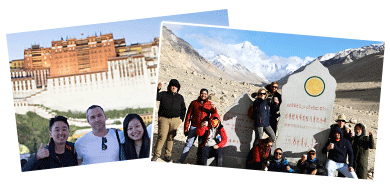

.jpg)



 View Trip
Map
View Trip
Map
 5.0
5.0 